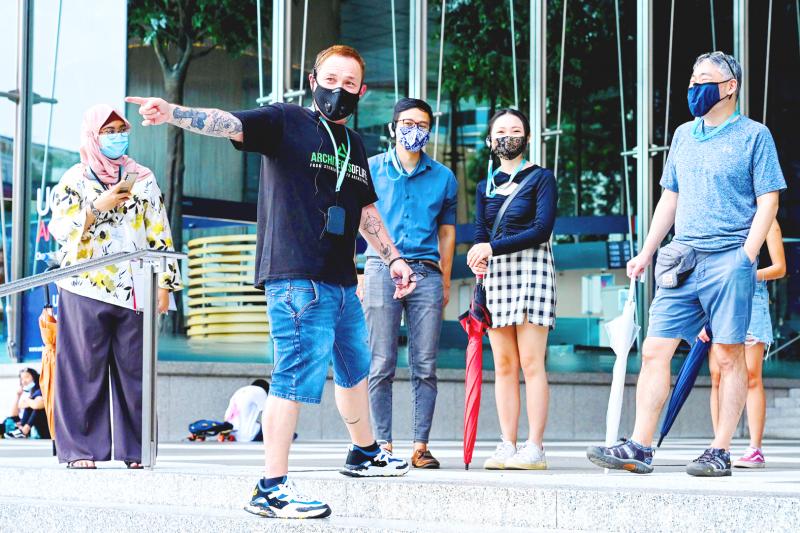A reformed gang member points out what were once opium dens and brothels on a tour of Singapore’s financial district that explores the squeaky-clean Asian business hub’s criminal past.
Now known for its clockwork orderliness and having one of the world’s lowest crime rates, the nation was once a gritty port plagued by rival mobsters.
“This was the headquarters of the biggest gang in Singapore,” says tour guide Bruce Mathieu, gesturing at a quiet street now housing restaurants, a hair salon and brightly colored murals.

Photo: AFP
He recalled wandering the area as a child during the 1970s, among street food vendors pushing carts, gambling halls and the distinctive smell of opium wafting down to the street from illicit upper-floor dens.
Singapore’s gangland history traces its roots to so-called “secret societies” formed by Chinese immigrants when they flocked to work in Singapore after it became a key British trading post in the 1800s.
The groups played an important role by providing the army of newcomers with a social network, help finding jobs — and protection.
Chinese immigrants had to join secret societies to avoid “getting bullied, getting robbed, getting killed,” Mathieu said.
Remnants of the gangs live on and criminal cases are still regularly linked to them, but nowhere near the scale of the past.
Besides sharing historical tidbits, Mathieu candidly recounts his life of crime and drug addiction in the hope that it will keep others from making the same mistakes.
The ex-gang member has spent about 20 years in prison for drug possession, robbery, assault, stabbing, theft and forgery.
Members of the tour gasped as the 51-year-old recalled his first gang fight at the age of 12 — after his friend was stabbed, he ran over to try to stop the bleeding with his T-shirt.
During his last stint in prison, which ended five years ago, the pain of being separated from his young daughter motivated him to quit drugs and leave his gang.
He now works as a motivational speaker and helps lead the “Triad Trails” tour to fight stereotypes about ex-offenders, an initiative partly organized by a non-profit group supporting former inmates.

LANDMARK CASE: ‘Every night we were dragged to US soldiers and sexually abused. Every week we were forced to undergo venereal disease tests,’ a victim said More than 100 South Korean women who were forced to work as prostitutes for US soldiers stationed in the country have filed a landmark lawsuit accusing Washington of abuse, their lawyers said yesterday. Historians and activists say tens of thousands of South Korean women worked for state-sanctioned brothels from the 1950s to 1980s, serving US troops stationed in country to protect the South from North Korea. In 2022, South Korea’s top court ruled that the government had illegally “established, managed and operated” such brothels for the US military, ordering it to pay about 120 plaintiffs compensation. Last week, 117 victims

China on Monday announced its first ever sanctions against an individual Japanese lawmaker, targeting China-born Hei Seki for “spreading fallacies” on issues such as Taiwan, Hong Kong and disputed islands, prompting a protest from Tokyo. Beijing has an ongoing spat with Tokyo over islands in the East China Sea claimed by both countries, and considers foreign criticism on sensitive political topics to be acts of interference. Seki, a naturalised Japanese citizen, “spread false information, colluded with Japanese anti-China forces, and wantonly attacked and smeared China”, foreign ministry spokesman Lin Jian told reporters on Monday. “For his own selfish interests, (Seki)

Argentine President Javier Milei on Sunday vowed to “accelerate” his libertarian reforms after a crushing defeat in Buenos Aires provincial elections. The 54-year-old economist has slashed public spending, dismissed tens of thousands of public employees and led a major deregulation drive since taking office in December 2023. He acknowledged his party’s “clear defeat” by the center-left Peronist movement in the elections to the legislature of Buenos Aires province, the country’s economic powerhouse. A deflated-sounding Milei admitted to unspecified “mistakes” which he vowed to “correct,” but said he would not be swayed “one millimeter” from his reform agenda. “We will deepen and accelerate it,” he

Japan yesterday heralded the coming-of-age of Japanese Prince Hisahito with an elaborate ceremony at the Imperial Palace, where a succession crisis is brewing. The nephew of Japanese Emperor Naruhito, Hisahito received a black silk-and-lacquer crown at the ceremony, which marks the beginning of his royal adult life. “Thank you very much for bestowing the crown today at the coming-of-age ceremony,” Hisahito said. “I will fulfill my duties, being aware of my responsibilities as an adult member of the imperial family.” Although the emperor has a daughter — Princess Aiko — the 23-year-old has been sidelined by the royal family’s male-only